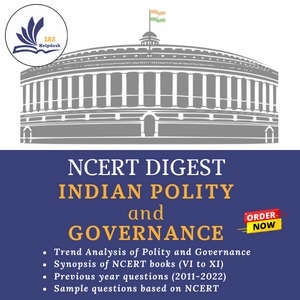Model Code of Conduct for Elections
Description
Model Code of Conduct for Elections
The Model Code of Conduct of ECI is a set of guidelines issued to regulate political parties and candidates prior to elections. The rules range from issues related to speeches, polling day, polling booths, portfolios, the content of election manifestos, processions, and general conduct, so that free and fair elections are conducted.
When does the Model Code of Conduct come into effect?
The MCC comes into force from the date the election schedule is announced until the date that results are out.
Key Principles of the Model Code of Conduct:
Equal Opportunity: The MCC emphasizes providing equal opportunities to all political parties and candidates to campaign and communicate their message to voters without any discrimination.
Integrity and Transparency: Political campaigning should be conducted with integrity and transparency, and any attempts to influence voters through unethical or illegal means are strictly prohibited.
Maintenance of Law and Order: Political parties and candidates are required to cooperate with law enforcement authorities to ensure the maintenance of law and order during elections. Any instances of violence or misconduct are dealt with promptly.
Respect for Democratic Values: The MCC upholds the principles of democracy, including respect for the Constitution, democratic institutions, and the rule of law. Hate speech, personal attacks, and incitement of violence are strictly prohibited.
Use of Government Resources: The misuse of government machinery, resources, and facilities for electoral gain is prohibited under the MCC. Government officials are required to maintain neutrality and refrain from favoring any particular party or candidate.
Enforcement of the Model Code of Conduct:
The Election Commission of India is responsible for enforcing the Model Code of Conduct and ensuring compliance by all stakeholders. The ECI monitors election activities closely and takes prompt action against any violations of the MCC. It has the authority to issue warnings, reprimands, and even disqualifications for serious breaches of the code.
Challenges and Criticisms:
While the Model Code of Conduct plays a crucial role in ensuring fair elections, it faces several challenges and criticisms. One common criticism is the lack of statutory backing, which limits the enforceability of the code. Additionally, instances of violations, such as hate speech and the misuse of government resources, continue to occur despite the guidelines.
Is the Model Code of Conduct legally binding?
The MCC evolved as part of the ECI’s drive to ensure free and fair elections and was the result of a consensus among major political parties. It has no statutory backing. Simply put, this means anybody breaching the MCC can’t be proceeded against under any clause of the Code. Everything is voluntary. The EC uses moral sanction or censure for its enforcement.
The ECI can issue a notice to a politician or a party for an alleged breach of the MCC either on its own or based on a complaint by another party or individual. Once a notice is issued, the person or party must reply in writing — either accepting fault and tendering an unconditional apology or rebutting the allegation. In the latter case, if the person or party is found guilty subsequently, he/it can attract a written censure from the ECI — something that many see as a mere slap on the wrist.
Conclusion:
India's Model Code of Conduct is a cornerstone of its electoral democracy, embodying the principles of fairness, transparency, and integrity. While it faces challenges, its enforcement by the Election Commission of India remains vital in safeguarding the democratic process. As India continues to evolve its electoral framework, the MCC will undoubtedly remain a key instrument in upholding the democratic values cherished by its citizens.
How to Prepare for IAS | FAQs on UPSC | Up-to-date Current Affairs | Latest Videos & Updates | Article: Simultaneous Elections in India

